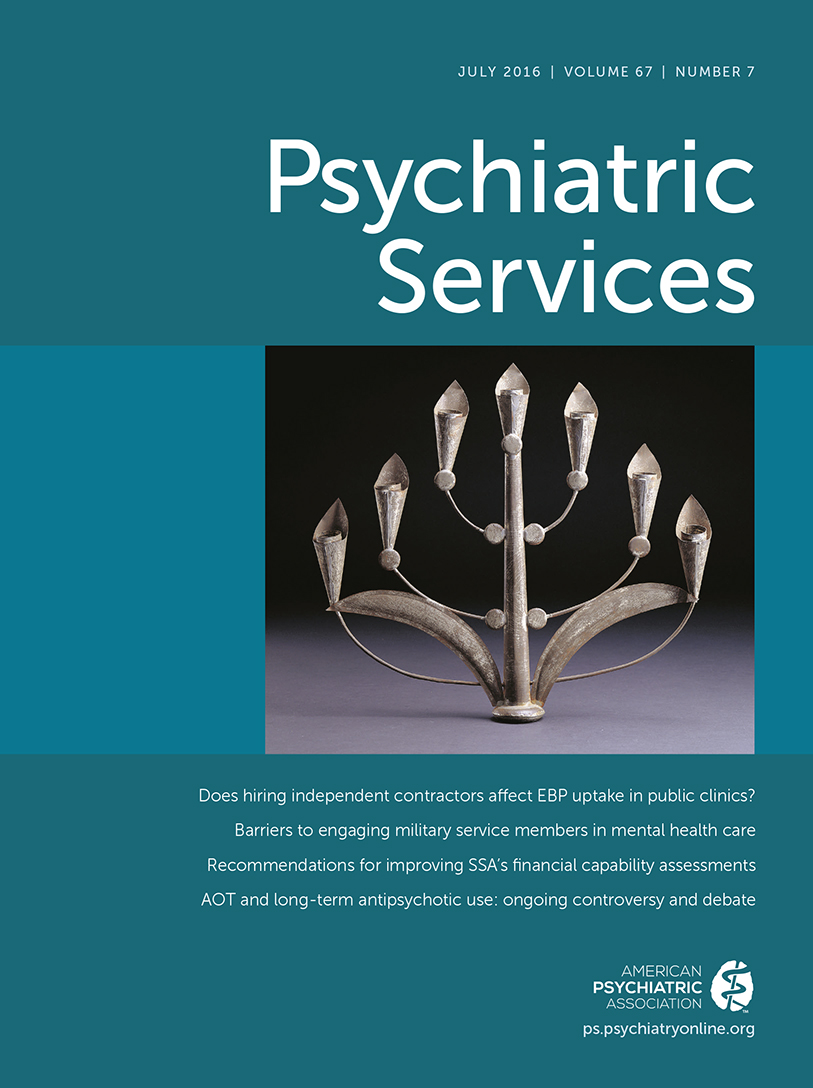This Month’s Highlights
Independent Contractors and EBPs
Public mental health clinics are increasingly hiring independent contractors to augment the workforce of salaried psychotherapy staff—a practice that may be slowing the uptake of evidence-based practices (EBPs), according to a study reported in this month’s lead article. Rinad S. Beidas, Ph.D., and colleagues analyzed quantitative and qualitative data from agencies and therapists participating in EBP initiatives in Philadelphia. They looked at associations between clinicians’ status (contractor or salaried), their attitudes toward and knowledge of EBPs, and organizational culture and climate. Independent contractors endorsed less positive attitudes toward EBPs and scored lower on EBP knowledge. One reason may be that some agency leaders reported being reluctant to invest in EBP training for contractors, seeking to avoid a potential loss of investment if contractors left the agency (page Original article: 710). In a Taking Issue commentary, Anita Everett, M.D., president-elect of the American Psychiatric Association, underlines the importance of these findings in the post–Affordable Care Act era, as newly insured Americans increase the demand for treatment. Public mental health clinics are under intensified pressures to provide demonstrably high-quality care, she notes, and clinics must understand the trade-offs that come with salaried versus contracted employees (page Original article: 701).
Focus on Service Members and Veterans
Four studies this month examined services for active duty military service members and veterans. Terri Tanielian, M.A., and colleagues interviewed patients, providers, and care managers at six large military installations and identified two main types of service access barriers encountered by service members: those related to the military health care system and those related to the attitudes and culture of the Army. Some findings suggest a need to reexamine commanders’ roles to ensure that they are facilitators of and not barriers to the care needed by their troops, the authors concluded (page Original article: 718). Helen C. Kales, M.D., and colleagues found two main predictors of antidepressant nonadherence in a sample of veterans age 60 and older: African-American race and general medical comorbidity. Providers should tailor interventions accordingly, they concluded (page Original article: 728). An evaluation team led by James P. LePage, Ph.D., found that incorporating the principles of supported employment, specifically Individual Placement and Support (IPS), into an existing group-based vocational program for previously incarcerated veterans boosted employment rates at six-month follow-up (page Original article: 735). Finally Marek S. Kopacz, M.D., Ph.D., and colleagues found that chaplains were more likely than other VA clinicians to use the ICD-9-CM diagnosis code V62.89 (other psychological or physical stress, not elsewhere classified) in clinical records when treating veterans who survived a suicide attempt (page Original article: 807).
Treating Severe Mental Illness in LGBT Populations
A scoping review in this month’s issue explored the following question: “What factors and strategies need to be considered when developing services for individuals from sexual or gender minority groups who are experiencing severe mental illness?” Sean A. Kidd, Ph.D., and colleagues examined findings from 27 relevant publications, noting that sexual identity and gender identity are poorly addressed in the context of severe mental illness. A “very modest body of work” suggests that compared with persons in the general population, lesbian, gay, bisexual, transgender, and transsexual (LGBT) individuals have a greater risk of developing severe mental illnesses—a risk that appears to be associated with discrimination. They report less service satisfaction, compared with the general population. However, the studies reviewed provided minimal evidence about specific interventions, and findings were based largely on urban North American samples. More work is needed to “cultivate service cultures of inclusion that might benefit all service recipients,” the authors concluded (page Original article: 779).
AOT and Long-Term Antipsychotic Use
In an Open Forum essay, Shawn S. Barnes, M.D., and Nicolas Badre, M.D., raise concerns that assisted outpatient treatment (AOT) coerces patients into long-term use (one to two years) of antipsychotics and that evidence may not support extended use of these drugs, which have potentially serious side effects. When the essay was published online in mid-March, it drew pointed letters from several psychiatrists and the Treatment Advocacy Center. A central objection was to the following sentence: “In most cases, AOT includes mandated medication administration.” After a discussion with the editor, Dr. Barnes and Dr. Badre agreed to a clarification, and the sentence was replaced with the following: “Although AOT laws do not allow forcible restraint and medication injection, they permit involuntary detention if patients deviate from their treatment plan, and the treatment plan will likely include antipsychotic medication.” Dr. Barnes and Dr. Badre respond to other critiques of their argument in this month’s letters section (page Original article: 816).



